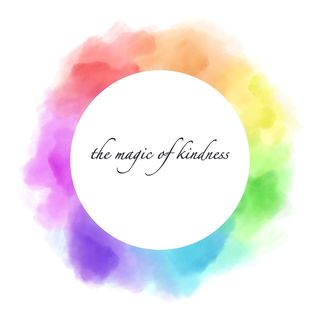Meditation
Why Choose Kindness
Boost your well-being by being kind—to others and to yourself.
Posted April 11, 2019 Reviewed by Jessica Schrader

“Three things in human life are important,” wrote novelist Henry James in the early 20th century. “The first is to be kind. The second is to be kind. The third is to be kind.”
As one of humankind’s cardinal virtues and most cherished social currencies, kindness—no doubt—is important. According to one hypothesis, pro-social traits like kindness may have even primed our species for the evolution of language. As children and as adults, we seek kindness from our friends and our mates. We spend our days giving and receiving kindness. We remember kindness, too, its trail of goodwill echoing through our memory banks like sweet perfume, long after the moment has passed. Kindness moves us. It nourishes and heals; strengthens and uplifts. A smile, a touch born of kindness can crack open the most rugged of hearts, unclench the tightest of fists. It has been hailed by poets, philosophers, and spiritual leaders as a gift, a religion, a language audible to the deaf and visible to the blind, a weapon to fight evil, and mankind’s greatest delight. And now, science is showing just why the accolades ring true.
Kindness boosts well-being
If you recall the rush of positive feelings you experienced the last time you performed a kind act, you would likely agree that kindness feels good. This distinct sense of satisfaction, the “warm glow” or the “helper’s high” that ignites the brain’s reward systems, is said to be among the drivers of pro-social behavior in humans. Kindness not only feels good but also does us good. To begin with, connecting with others through kind deeds allows us to meet our basic psychological needs of relatedness and belonging. Performing acts of kindness can also increase life satisfaction, positive mood, and peer acceptance. It can stimulate the release of serotonin and oxytocin, which can increase trust, reduce fear and anxiety, and help us read each other’s minds. For the elderly, prosocial behavior can promote longevity. For teenagers, it can boost self-esteem. Kindness also makes us happy. Researchers at Oxford University recently found that we can increase our happiness levels when we are kind to those with whom we enjoy close as well as weak ties (for example, family and strangers). Even observing others perform kind acts and, importantly, being kind to ourselves, can make us happier.
For psychotherapist and author of The Kindness Cure Dr. Tara Cousineau, kindness is a moment of human connection. Since every interaction carries the potential of threat and reward, it takes vulnerability and courage to hold these potentials at the same time in this moment of connection. Perhaps that is why in our modern culture, where it is easy to grow suspicious of kindness, to see it as weak and soft, to be bombarded with messages that the world is an unsafe and unkind place, Cousineau views kindness as “love in action.”
Here are three insights into kindness from Dr. Cousineau.
Start with yourself
In her experience as a psychotherapist, Cousineau has observed how remarkably unkind people can be towards themselves when they talk about their lives. Perhaps worst of all, we don’t recognize how unkind we are to ourselves. “If we would tune into our internal dialogue, most likely we wouldn’t say those same words to someone we love: I am not good enough, I’m not smart enough, I am not something enough. We are mired in regrets from the past or worries about the future. We compare and despair,” she says. Naturally, it may be easier to be kind to others than to ourselves, so it may take some intention and effort to befriend ourselves, too.
The key to learning to be kinder to ourselves lies in self-compassion. Self-compassion stands upon three pillars: self-kindness (treating yourself with the kindness and understanding you would show to someone you love), common humanity (recognizing that you are not alone in your pain and that suffering is a shared human experience), and mindfulness (holding your negative experiences as they are—without suppressing them or over-identifying with them). As a bonus, self-compassion comes with a wealth of well-being benefits: from building resilience, optimism, and healthier stress response, to reducing depression, anxiety and rumination (for review, see Neff & Germer, 2017).
Cultivate your kindness instinct
Some people are inclined to be more empathic than others. In general, however, we all are born with a kindness (compassion) instinct. Our nervous systems have evolved to have a highly attuned sensitivity to caring about others. Darwin considered the “sympathy instinct” as one of the strongest human instincts which helped our species survive and flourish. It is this instinct that we need to nurture, according to Cousineau, by strengthening our compassion muscle and its neural wiring. And not only in kindergarten, when children are taught to write thank-you notes and do kind acts but also across the lifespan. “Kindness is not random,” says Cousineau. “We have to intentionally redirect our energy and attention to noticing what is good, pleasant and beautiful about humanity.” We might be surprised at the joy we stumble upon in the process.
One way of cultivating compassion and kindness is through loving-kindness meditation. It involves closing your eyes, thinking of someone in your life who you love dearly and sending them wishes of well-being, love, and safety by repeating silently:
May you feel safe,
May you feel happy,
May you feel healthy,
May you live with ease.
After holding your warm and tender feelings in your heart, send them to someone else, again, repeating silently the four phrases. Don’t forget to tuck yourself in your compassion circle as well, says Cousineau. Repeat the phrases for yourself, “May I feel safe, may I feel happy …” Gradually expand your circle of people to whom you are sending your well-wishes and love to include people in your neighborhood or community, and then even further to all living beings. (Here is a guided loving-kindness meditation from psychologist Barbara Fredrickson). Practicing this meditation regularly can increase self-compassion and decrease self-criticism. Other well-being benefits of the loving-kindness meditation include increases in positive emotions, empathy, social connection, as well as a decrease in negative emotions, chronic pain and PTSD symptoms. It doesn’t take much for us to wish well upon others, whether in meditation or as we throng through crowded streets on our daily commute. And yet, we might just spill some of that goodwill on ourselves by the time we reach our destinations.
Find ways to be kind
To cultivate kindness as a practice, Cousineau invites us to reflect on one key question:
How can I bring kindness into my day, whether to me or another person, in any small way?
We could look for something generous to say about the people with whom we are interacting. We could find ways to be of service. We could recharge our days with moments of gratitude and appreciation, caring and curiosity. We could show ourselves the kindness we crave from others through self-compassion and self-care. This includes becoming aware when we feel overwhelmed, depleted and when our threat systems are ignited. After all, as Cousineau notes, stress is often what gets in the way of kindness. “It’s harder to bring online our sense of caring when we are in survival mode, even if it’s a mental state,” she notes. At the end of the day, Cousineau suggests bringing front and center of our consciousness the things that went well – the moments when we gave ourselves and others the gift of kindness – and to notice what happens. Perhaps, as Scottish biographer James Boswell wrote in the 18th century, we could witness our vessels being filled drop by drop with acts of kindness, until, at last, our hearts run over.
Many thanks to Tara Cousineau for her time and insights. Dr. Cousineau is a clinical psychologist, staff psychologist at Harvard University, and author of The Kindness Cure: How the Science of Compassion Can Heal Your Heart and Your World.
References
Cousineau, T. (2018) The Kindness Cure: How the Science of Compassion Can Heal Your Heart and Your World. New Harbinger Publications. Oakland, CA.
Otake, K., Shimai, S., Tanaka-Matsumi, J., Otsui, K., & Fredrickson, B. L. (2006). Happy people become happier through kindness: A counting kindnesses intervention. Journal of Happiness Studies, 7(3), 361-375.
Boellinghaus, I., Jones, F. W., & Hutton, J. (2014). The role of mindfulness and loving-kindness meditation in cultivating self-compassion and other-focused concern in health care professionals. Mindfulness, 5(2), 129-138.
Fu, X., Padilla-Walker, L. M., & Brown, M. N. (2017). Longitudinal relations between adolescents' self-esteem and prosocial behavior toward strangers, friends and family. Journal of Adolescence, 57, 90-98.
Neff, K. D. & Germer, C. (2017). Self-Compassion and Psychological Wellbeing. In J. Doty (Ed.) Oxford Handbook of Compassion Science, Chap. 27. Oxford University Press.
Buss, D. M., Abbott, M., Angleitner, A., Asherian, A., Biaggio, A., Blanco-Villasenor, A., ... & Ekehammar, B. (1990). International preferences in selecting mates: A study of 37 cultures. Journal of Cross-Cultural Psychology, 21(1), 5-47.
Erard, M., & Matacic, C. (2018). Did kindness prime our species for language? Science, 361 (6401), 436-437.
Layous, K., Nelson, S. K., Oberle, E., Schonert-Reichl, K. A., & Lyubomirsky, S. (2012). Kindness counts: Prompting prosocial behavior in preadolescents boosts peer acceptance and well-being. PloS one, 7(12), e51380.
Luks, A., & Payne, P. (2001). The healing power of doing good: The health and spiritual benefits of helping others. iUniverse.
Kosfeld, M., Heinrichs, M., Zak, P. J., Fischbacher, U., & Fehr, E. (2005). Oxytocin increases trust in humans. Nature, 435(7042), 673.
Domes, G., Heinrichs, M., Michel, A., Berger, C., & Herpertz, S. C. (2007). Oxytocin improves “mind-reading” in humans. Biological Psychiatry, 61(6), 731-733.
Neumann, I. D., & Slattery, D. A. (2016). Oxytocin in general anxiety and social fear: a translational approach. Biological Psychiatry, 79(3), 213-221.
Hamilton, D. R. (2010). Why kindness is good for you. London: Hay House.
Van Willigen, M. (2000). Differential benefits of volunteering across the life course. The Journals of Gerontology Series B: Psychological Sciences and Social Sciences, 55(5), S308-S318.
Rowland, L., & Curry, O. S. (2018). A range of kindness activities boost happiness. The Journal of Social Psychology, 1-4.
Fredrickson, B. L., Cohn, M. A., Coffey, K. A., Pek, J., & Finkel, S. M. (2008). Open hearts build lives: positive emotions, induced through loving-kindness meditation, build consequential personal resources. Journal of personality and social psychology, 95(5), 1045.
Neff, K. (2003). Self-compassion: An alternative conceptualization of a healthy attitude toward oneself. Self and identity, 2(2), 85-101.
Klimecki, O. M., Leiberg, S., Lamm, C., & Singer, T. (2012). Functional neural plasticity and associated changes in positive affect after compassion training. Cerebral cortex, 23(7), 1552-1561.
Kok, B. E., Coffey, K. A., Cohn, M. A., Catalino, L. I., Vacharkulksemsuk, T., Algoe, S. B., ... & Fredrickson, B. L. (2013). How positive emotions build physical health: Perceived positive social connections account for the upward spiral between positive emotions and vagal tone. Psychological science, 24(7), 1123-1132.
Shahar, B., Szepsenwol, O., Zilcha‐Mano, S., Haim, N., Zamir, O., Levi‐Yeshuvi, S., & Levit‐Binnun, N. (2015). A wait‐list randomized controlled trial of loving‐kindness meditation programme for self‐criticism. Clinical psychology & psychotherapy, 22(4), 346-356.
Kearney, D. J., Malte, C. A., McManus, C., Martinez, M. E., Felleman, B., & Simpson, T. L. (2013). Loving‐kindness meditation for posttraumatic stress disorder: A pilot study. Journal of Traumatic Stress, 26(4), 426-434.
Carson, J. W., Keefe, F. J., Lynch, T. R., Carson, K. M., Goli, V., Fras, A. M., & Thorp, S. R. (2005). Loving-kindness meditation for chronic low back pain: Results from a pilot trial. Journal of Holistic Nursing, 23(3), 287-304.
Buchanan, K. E., & Bardi, A. (2010). Acts of kindness and acts of novelty affect life satisfaction. The Journal of social psychology, 150(3), 235-237.
Goetz, J. L., Keltner, D., & Simon-Thomas, E. (2010). Compassion: an evolutionary analysis and empirical review. Psychological bulletin, 136(3), 351.




